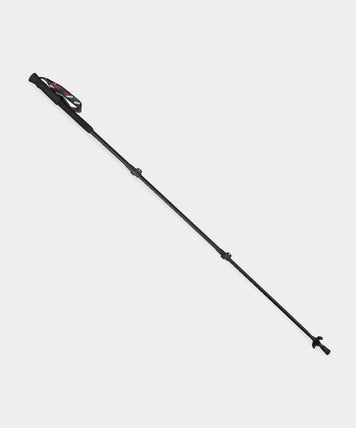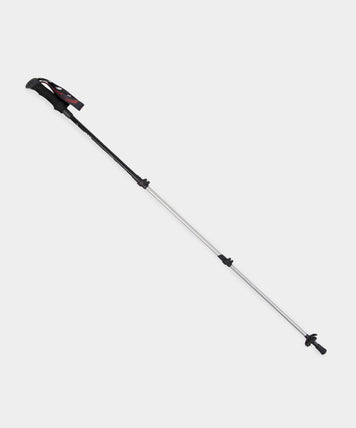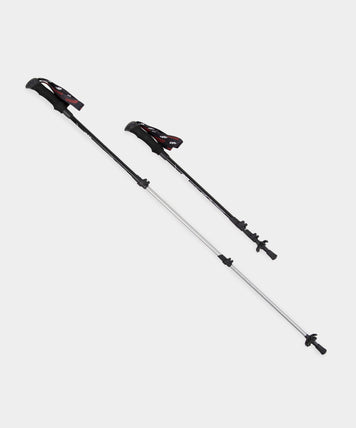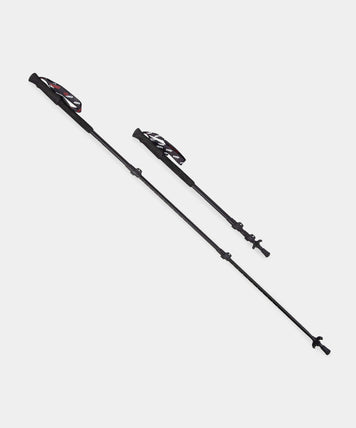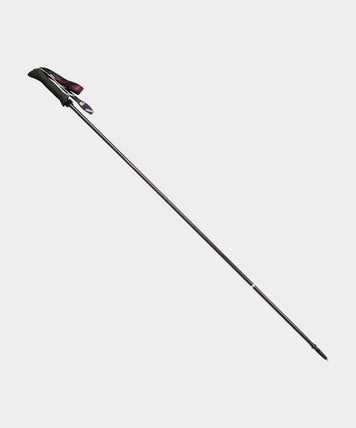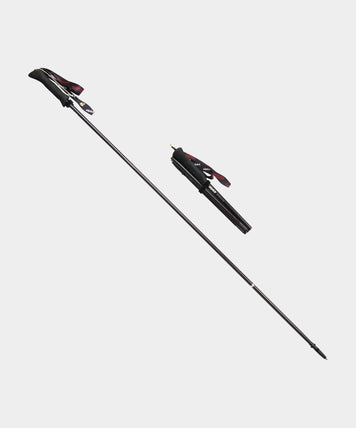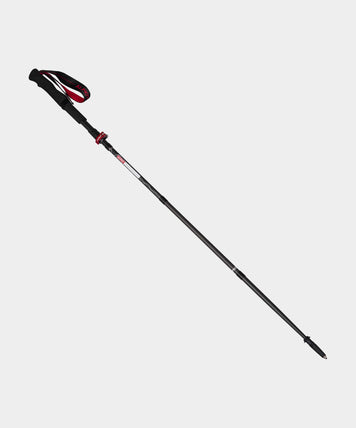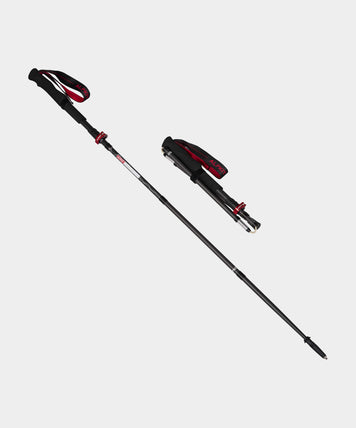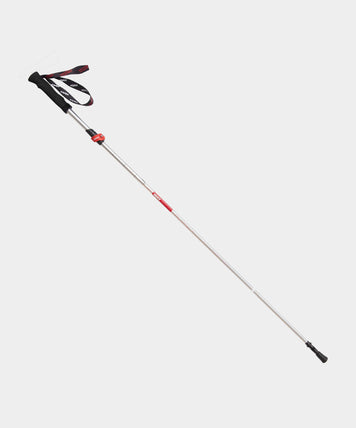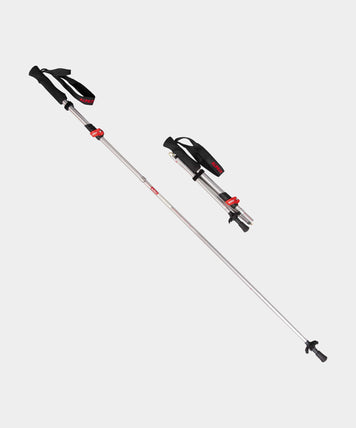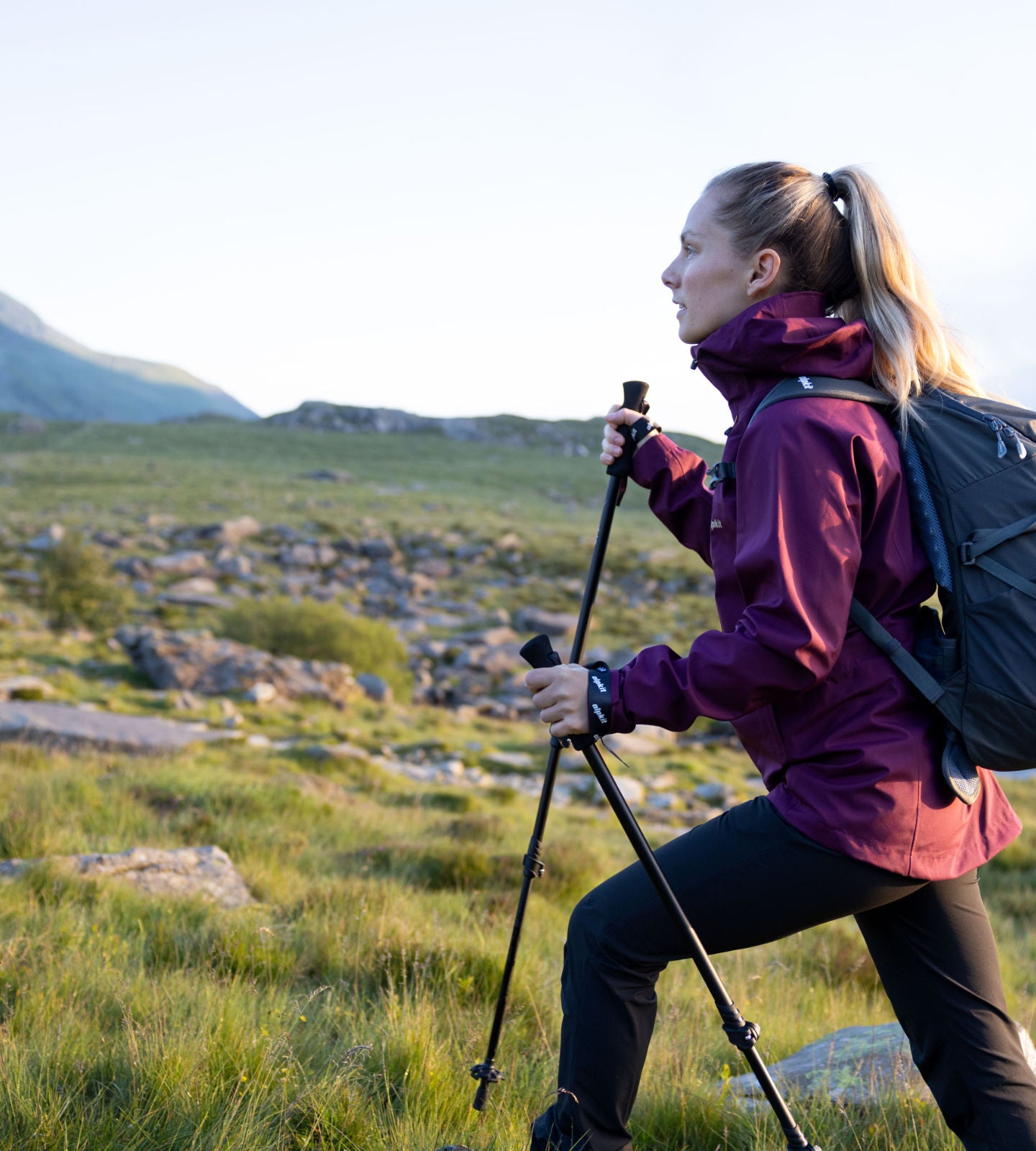
Walking poles can reduce joint strain and improve fitness. Learn how to use them properly to maximize benefits and enhance your hiking adventures.
Walking with poles may seem like a daunting task, but it can be a great way to improve your balance, reduce the impact on your joints and increase your overall fitness level. In this article, we will share some tips on how to use walking poles, so you can get the most out of them on your next trek.
1. Adjusting the pole length
Before you start walking, it's important to adjust the height of your poles to suit your height. The ideal length for your poles should be such that your elbow makes a 90-degree angle when you hold the pole with your forearm parallel to the ground.

Alpkit trekking poles use one of the following adjustment systems. Please follow the instructions that apply to your poles. Do not extend any poles past the STOP indicator.
Snaplock Poles
- Hold the pole in one hand and use your thumb to open the Snaplock cam.
- Extend or adjust to size before closing the cam again.
- If the pole is slipping, you may need to adjust the Snaplock tension:
- Open the cam, then turn the adjustment screw until the cam closes securely and without too much resistance. Do not overtighten, this can jam the mechanism or damage the pole.
- Turn screw clockwise to tighten or anti-clockwise to loosen.
Twist Lock Poles
- To unlock, twist the lower pole section clockwise, extend or adjust to your requirements.
- Twist anti-clockwise to lock the pole back into position.
- Repeat with the other sections.
! Do not overtighten. This may jam the mechanism or damage the pole.
! Do not extend beyond the STOP line.
Occasionally the expanding widget may not lock on the inside of the pole. If this happens pull out the lower section. Make sure the widget is clean and dry. Twist the widget with your fingers so that it expands. It should be a snug fit when you insert it back into the larger pole. Twist to lock.
Quickwire Poles
These poles have a continuous wire running through the pole sections.
- Pull out the lowest pole section, allowing the connectors to slide into position until the locking pin pops out.
- Adjust for length using the upper Snaplock mechanism on the upper section.
- To fold, press in the locking pin and slide in the lowest pole section, this will give the internal wire the slack it needs for you to fold your poles them back up again.
2. Hold the poles correctly
The correct grip is essential for efficient use of walking poles. Put your hand through the loop from underneath, enough so that loop goes to about the wrist, and then grab hold of the handle. When the strap is the correct length it should allow you to grip the handle comfortably. Too short and the strap will feel tight around the wrist, too long and you will feel no support. The trick here is not to hold the handle too tightly, let the strap do the work.

3. Start with small steps
Start with small steps by planting the pole first and then stepping forward with the opposite leg. This technique will allow you to maintain your balance and prevent you from overusing your arms. Try to keep your arms close to your body and relaxed.
4. Adjusting the angle of the pole
It is important to adjust the trekking pole length to suit the terrain. When ascending you could shorten the pole and on descents lengthen it or just use the palm of you hand on the top of the pole. When traversing a slope or on a zig zag path it maybe be best to have one long and one short and swap them at each turn. But just remember you supposed to be walking not forever adjusting you poles!
5. Pace yourself
It's essential to pace yourself when using walking poles. Don't rush into using them for prolonged periods or longer walks. It's best to start by using them for shorter walks and gradually increase the duration and intensity of your walks.
Aim for a relaxed grip that allows the trekking pole to have natural swinging action. You should use opposite pole to the leading leg, so right pole left leg and vice versa. The position of the pole plant should be roughly level with your foot but it's what ever suits you.
6. Negotiating tricky terrain
It is important to remember the limitations of your trekking poles, especially when the terrain gets tricky. On rocky terrain where you need to scramble or climb it is very often best to pack the poles away and use your hands to better advantage. Choose a rucksack with attachment straps to stow away your poles safely.
7. Take care of your poles
To ensure that your poles last longer, it's important to take proper care of them. Always store them in a dry place, keep the straps clean, replace the tips when they start to wear out, and inspect the poles regularly for any signs of damage.
- Clean your trekking poles periodically, especially after use in muddy and wet conditions. To clean, pull the poles out of pole sleeves before wiping with a damp cloth.
- Allow poles to dry completely before reassembly and storage. Storing poles in wet conditions can cause parts to corrode, making adjustment difficult or impossible.
- Release the Snaplock mechanisms before storing for a long time.
- Check your poles regularly for dents and cracks that may prevent adjustment or weaken the pole.
- Oil any screw threads periodically.
In summary, walking with poles can be an excellent way to stay active, improve balance, and reduce the impact on your joints. By following the tips we've outlined, you'll be well on your way to using your walking poles like a pro.

